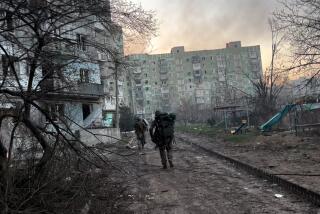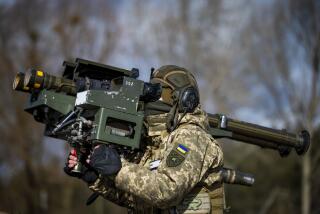Troops Face Off With Grit
- Share via
The sand is like thick powder, choking men and machinery. When the rain starts, it becomes the texture of peanut butter. Everything turns burnt orange, then all goes dark.
On Tuesday, a fierce sandstorm enveloped the Euphrates Valley. Lead U.S. Marine and Army forces that hours earlier were closing in on Baghdad were frozen in their tracks and had to hunker down to avoid nature’s onslaught.
Elements of the 1st Marine Division on Monday were rolling across three lanes on a highway north of the Euphrates River. With the storm churning ash-like sand, and fears of ambushes or unseen sniper fire running high, the Marines’ tanks and trucks slowed to a crawl, and finally halted.
Visibility was less than 10 feet. A leg of the journey that should have taken eight hours took 26. About 20 vehicles -- out of 70 -- broke down as sand clogged their innards. Others got lost, separated from their units, or drove in circles.
Troops pulled on bulky plastic goggles to protect against the dust. At 3 p.m., it looked like the middle of the night, except the darkness had an orange glow and was accompanied by a haunting howl.
The debris of the desert -- rocks, bushes, trash -- hurtled by as though in a tornado. One convoy wandered into a minefield and struck a mine. No one was hurt. One disoriented soldier, who had wandered for hours, was found by his comrades at dawn today. He was dehydrated but otherwise fine.
Marines were instructed not to leave their armored vehicles. Going even a few steps meant the risk of getting lost or being hit by a sand-blinded vehicle. Instead they cleaned their M-16 rifles over and over. The only good thing, mused one, was that the storm chased off the desert gnats that had been stinging and biting every bit of exposed human flesh.
“We’re fighting the terrain more than the enemy,” said the division’s chief of staff, Col. Ben Saylor. “Terrain includes weather.”
The night-vision goggles didn’t work. Trucks broke down; Marines from each disabled vehicle had to pile into another, functioning one to keep up with the unit. Among those was the company psychiatrist, Dr. Jason Bennett of Denver.
His advice? “Grin and bear it.”
“This is the worst I’ve ever seen,” said Gunnery Sgt. Bob Gray of Oceanside, Calif., who has spent two years in the Persian Gulf. “At least nobody’s hurt, yet.”
Many of the troops will suffer respiratory problems come morning, he predicted. Settling into tents that flapped loudly, the troops were already hacking, coughing and wheezing.
Senior military commanders insisted that weather and sand would not derail the U.S.-British assault on Baghdad and Iraqi President Saddam Hussein.
But on the battlefield, some wondered. Sand can ground fighter aircraft and disable a gun.
Anchoring the northern end of the front, the Army’s 4th Battalion, 64th Armored Regiment, suffered the same conditions. Guards resorted to thermal scanning devices to protect against snipers who have already killed one soldier at a nearby bivouac site.
By early evening, several Humvees began clustering. A group of supply and support vehicles returning to the staging area had to navigate with a global-positioning system.
Soldiers exhausted by nonstop movement during the first 72 hours of the war had mostly bedded down, emerging from their vehicles in time for the storm’s worst fury.
Inside cramped confines, they huddled to hear news summaries over military radio channels, the booing of documentary maker Michael Moore’s antiwar speech at Sunday’s Oscars ceremony drawing cheers.
News that a poll indicated 45% of Americans believe the war will last for months drew groans and curses.
A flash-flood warning was issued for the overnight hours, and soon rain began to fall, pounding the sand to paste.
More to Read
Sign up for Essential California
The most important California stories and recommendations in your inbox every morning.
You may occasionally receive promotional content from the Los Angeles Times.














